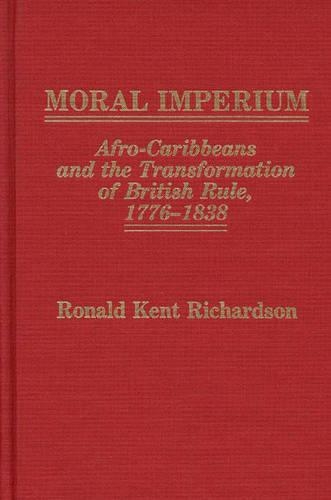
Moral Imperium: Afro-Caribbeans and the Transformation of British Rule, 1776-1838
(Hardback)
Publishing Details
Moral Imperium: Afro-Caribbeans and the Transformation of British Rule, 1776-1838
By (Author) Ronald Richardson
Bloomsbury Publishing PLC
Praeger Publishers Inc
19th January 1987
United States
Classifications
Tertiary Education
Non Fiction
326.09729
Physical Properties
Hardback
219
Description
During the past decade, the problem of British slave emancipation has generated considerable historiographical debate. Yet, until now, this debate has emphasized the relative importance of ideals and material self-interest in the British emancipation movement. In Moral Imperium, Ronald Richardson offers a new assessment of the relative importance of ideas, religious enthusiasm, national interest, and political circumstances. Arguing that historians have yet to develop an understanding of the impact of the Afro-Caribbean population on the development of British anti-slavery thought in general and the anti-slavery movement as a whole, he contends that abolition and emancipation were carried out in the context of British rule and were designed to create a social environment that would be receptive to British needs.
Reviews
"A welcome addition to the literature on British abolitionism. Eschewing idealist interpretations, Richardson represents the antislavery movement as an effort of social reconstruction expressing the relationship of the Bristish ruling elite to Afro-Caribbean people.' He proposes a nexus between Caribbean slaves who, with heightened rebelliousness, threatened the integrity of British rule during the Age of Revolution and the rise of a metropolitan crusade to eradicate slavery as a moral evil. In this view, antislavery was part of a broader effort to establish the imperial relationship between Great Britain and the Caribbean on a more stable social foundation.... [His] lively, well-written monograph advances an analytical framework that students of abolitionism and Caribbean history will find useful for years to come. The book's value is enhanced by a fine summary discussion of the escalating tensions of Caribbean slave societies during the 18th and 19th centuries."-Choice
A welcome addition to the literature on British abolitionism. Eschewing idealist interpretations, Richardson represents the antislavery movement as an effort of social reconstruction expressing the relationship of the Bristish ruling elite to Afro-Caribbean people.' He proposes a nexus between Caribbean slaves who, with heightened rebelliousness, threatened the integrity of British rule during the Age of Revolution and the rise of a metropolitan crusade to eradicate slavery as a moral evil. In this view, antislavery was part of a broader effort to establish the imperial relationship between Great Britain and the Caribbean on a more stable social foundation.... [His] lively, well-written monograph advances an analytical framework that students of abolitionism and Caribbean history will find useful for years to come. The book's value is enhanced by a fine summary discussion of the escalating tensions of Caribbean slave societies during the 18th and 19th centuries.-Choice
The Origins and developmental patterns of abolitionism continue to attract substantial scholarly attention, and within this debate the British case retains a central role. Eric William's formulation, in which abolition sprang directly from the operation of economic interests, has been replaced by models which attribute a larger role to ideology, but it would be wrong to suggest that a clear consensus has emerged. A central issue in the debate concerns the reasons why it was the slave system of the Americas that became the focus of reform, rather than the domestic injustices of industrializing Britain or slavery elsewhere in the world. It is this problem that Richardson tackles in Moral Imperium. There is much to commend Richard's interpretation. His discussion of evangelical ideology is particularly well done, and adds to our understanding of the abolitionists' essentially conservative conception of postemancipation West Indian society. Richardson also provides fresh insights into the role of free blacks in Britain in bringing cases to the attention of the abolitionists. . . The author is successful in drawing attention to the role of slaves and free blacks in the achievement of abolition in the British empire, and for this reason his work is a significant contribution to the larger debate.-hahr
"The Origins and developmental patterns of abolitionism continue to attract substantial scholarly attention, and within this debate the British case retains a central role. Eric William's formulation, in which abolition sprang directly from the operation of economic interests, has been replaced by models which attribute a larger role to ideology, but it would be wrong to suggest that a clear consensus has emerged. A central issue in the debate concerns the reasons why it was the slave system of the Americas that became the focus of reform, rather than the domestic injustices of industrializing Britain or slavery elsewhere in the world. It is this problem that Richardson tackles in Moral Imperium. There is much to commend Richard's interpretation. His discussion of evangelical ideology is particularly well done, and adds to our understanding of the abolitionists' essentially conservative conception of postemancipation West Indian society. Richardson also provides fresh insights into the role of free blacks in Britain in bringing cases to the attention of the abolitionists. . . The author is successful in drawing attention to the role of slaves and free blacks in the achievement of abolition in the British empire, and for this reason his work is a significant contribution to the larger debate."-hahr
Author Bio
RONALD KENT RICHARDSON has lectured extensively in Afro-American and Caribbean Studies and has served as a university administrator.
